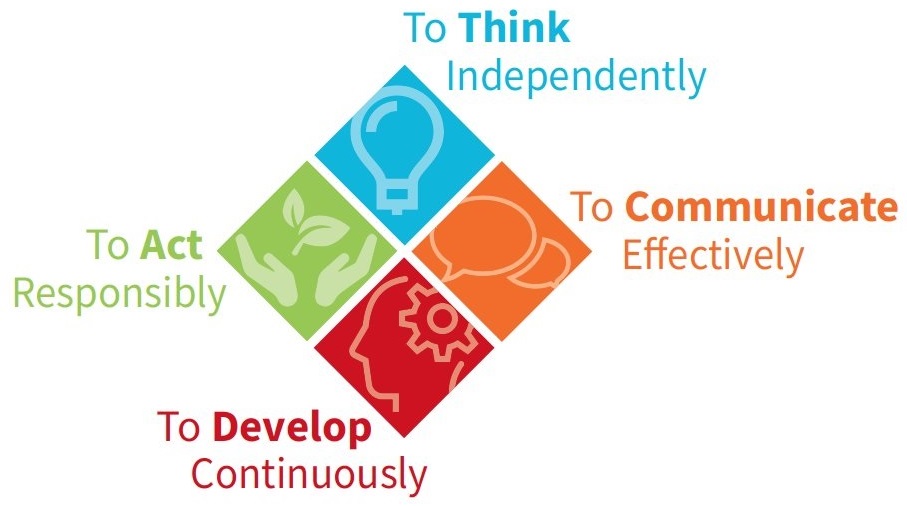The What and Why of Assessment

As a student at Trinity, you are likely to encounter many different types of assessment. Although we typically think of assessment as exams, assignments or essays, assessments come in many forms and they serve a range of purposes.
One of the most important roles of assessment is to enhance your learning and prepare you for life and work as a graduate.
This section aims to help you to identify the purpose of your assessments and the standards expected of you. It aims to help you make sense of your assessment so that you have more control over how you approach assessments and how you use them to evidence and support your learning.
Click on the links below for more information.
Taking control of your assessment: developing assessment literacy
As a university student, it is really important that you become an active learner and take control of your own learning. Active learning in assessment is where you plan, reflect on and monitor your approaches to assessment.
‘Assessment literacy’ is a term that refers to your capacity to make sense of assessment so that you can have more control over your learning. Having an understanding of the purposes of assessment and what’s expected of you, gives you greater knowledge of how academics assess. You can also gain valuable skills such as self-evaluation and meta-learning (learning about how you learn), which not only help you to progress in your learning at university but are very useful skills in your future careers. The Trinity Graduate Attributes highlight the importance of skills such as these.
Trinity Graduate Attributes

How can I ace assessment literacy?
The aim of this student hub is to develop your assessment literacy by helping you to understand the nature and purpose of your assessment, as well as different assessment techniques and types used in your discipline. Digital assessment – that is, assessment enabled by digital technologies – sometimes requires you to apply different skills than you would in traditional assessments. You will be introduced to these skills and hear some tips from your peers.
Technology can also help you to develop assessment literacy. For example,Turnitin teaches you the conventions of academic writing by checking referencing and citation. And online rubrics or assessment criteria make important assessment information readily available to you. To ace assessment literacy, this student hub will help you discover:
- the different reasons for doing assessments
- the different types of digital assessment commonly used in your discipline
- how to use assessment to reflect on our learning
- how to use feedback to improve your learning
- how to use assessment to set goals for future learning
- how to use rubrics to assess your work.
Assessment and learning
Assessment can serve a range of purposes and it plays a key role in driving student learning. The scope and purpose of assessments can be thought of in three ways:
- Assessment OF Learning
- Assessment FOR Learning
- Assessment AS Learning.
The concept that underpins all three terms is that they are all used to facilitate student learning. And while the goals and purpose of each type of assessment might vary, they are not mutually exclusive - some assessments may incorporate elements of more than one type. Click on the + signs below for more information.
The purpose of assessment
Assessment is often broken down into two main types: Summative and Formative. To make the most of your assessments, it is helpful to understand the various ways in which assessments might be used.
Summative Assessment:
- The main goal is to evaluate, and get a “snapshot” insight into, your performance or achievement
- Provides an opportunity for you to demonstrate the SUM of your learning, in particular your achievement of the module/programme learning outcomes
- Usually graded, high-stakes assessments that count towards your final mark e.g. end-of-semester examinations.
Formative Assessment:
- The main goal is to INFORM: to give you an idea of how you are progressing so far, and to help you target areas to work on in the future
- Provides an opportunity for you to receive feedback on your work
- Typically not graded or may have a small value towards a grade.
Key Takeaways
- Assessment Literacy is a term which refers to your capacity to understand the nature and purpose of your assessments. It helps to give you more control over how you approach your assessments and how you use them to evidence and support your learning.
- Assessment usually serves at least one of 3 main purposes: Assessment OF, FOR or AS Learning.
- Assessment is often broken down into two main types: Summative and Formative.
- In an online context, assessment types may differ, but the purposes of assessment, and the standard expected of you, will remain the same.
Resources
Self & Peer Assessment: A Practical Guide for Students WORD 2,804KB, PDF 815KB: Written by Ben Ryan (Trinity Student and IUA Intern), this resource provides an overview of self- and peer assessment processes, outlining how they may be useful to you in your own learning and how you can get most out of them.

